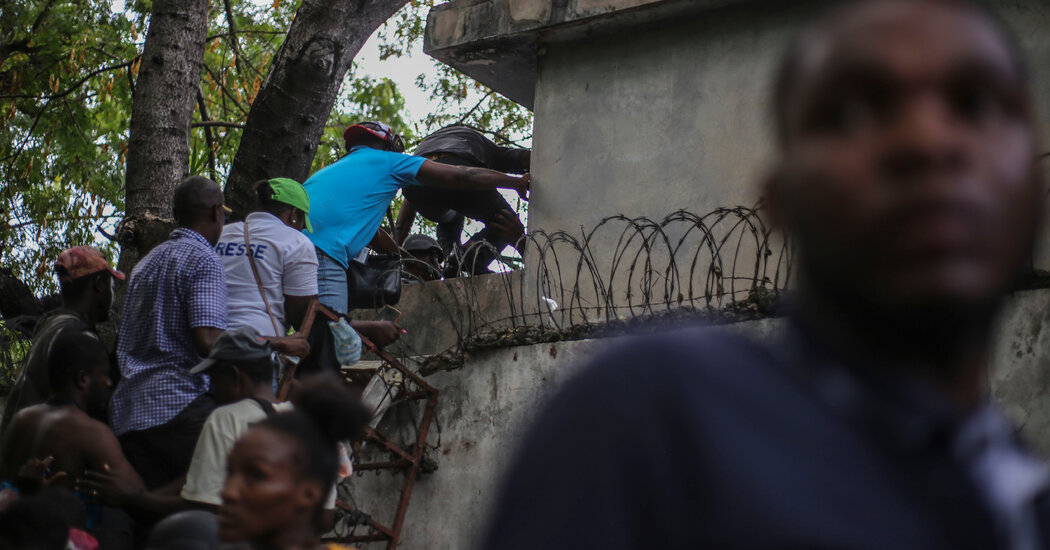A new injection of around 150 foreign officers arrived in Haiti this weekend to bolster an international security force tasked with reigning in the powerful, well-armed gangs that have inflicted so much misery on the country for months.
But if history is anything to go by, this latest injection is unlikely to make much of a difference.
The back-to-back massacres that killed more than 300 people, followed by a Christmas Eve attack on Haiti’s largest public hospital, underscored the Haitian government’s growing lack of control over the country’s deepening crisis. .
A press conference announcing the reopening of a public hospital closed for nine months due to gang violence was the subject of another gang attack, killing two journalists and a police officer.
More than two dozen journalists caught in the ambush were stuck for two hours triaging seven injured colleagues before being rescued. They tore their own clothes to make tourniquets and used tampons to stop the bleeding as, according to witnesses, the few doctors at the hospital ran for their lives. The journalists escaped by climbing a back wall.
“There was blood all over the floor and on our clothes,” said Jephté Bazil, a journalist for the online news site Machann Zen Haiti, adding that the hospital had nothing “available to treat the victims.”
The hospital shooting follows two massacres in different parts of the country that killed more than 350 people and highlighted the failures and shortcomings of local authorities and international security forces deployed to protect innocent civilians.
One of the massacres occurred last month in a poor, sprawling, gang-controlled neighborhood of Port-au-Prince, where the absence of any police presence meant that for three days elderly people were dismembered and thrown into the sea without the authorities noticing. At least 207 people were killed between December 6 and 11, according to the United Nations.
Around the same time, another three-day killing took place 70 miles north, at Petite Rivière. Community leaders say 150 people were killed when gang members and vigilante groups attacked each other.
The violence is part of a series of relentless bloodshed that has hit Haiti over the past two months, exposing the fragility of its interim government and raising concerns about the viability of a state-brokered security mission. -United and leaving a planned transition to elections and a more stable transition. leadership on the verge of collapse.
With President-elect Donald J. Trump poised to take the reins of an international deployment criticized as ineffective and underfunded, Haiti’s future has never looked so bleak.
Justice Minister Patrick Pélissier said he believed the 150 troops, mostly from Guatemala, should help reverse the trend. He stressed that some areas controlled by the gangs had been retaken and that the government was caring for the displaced people.
“The state has not collapsed,” Mr. Pélissier said. “The State is there. The State functions.
But many experts believe Haiti is a failed state, with various factions of the interim government embroiled in political wrangling, with no apparent strategy to combat worsening violence and pave the way for elections, which were supposed to take place this year.
“Political conflicts translate into violence,” said Diego Da Rin, a Haiti analyst at the International Crisis Group. “Gangs know very well when is the right time to switch from defensive to offensive mode. They flex their muscles when they need to.
The gang attacks also drew attention to the weakness of the U.S.-backed Multinational Security Support Mission, a detachment of several hundred mostly Kenyan police officers that began arriving in Haiti in June last.
The mission was supposed to have up to 2,500 officers, but with little international funding, the force is far smaller and lacks the personnel needed to tackle the many areas where gangs are well established.
Several experts said the Christmas Eve killings gave a sense that the government was incompetent. The event announcing the hospital’s reopening took place in a gang stronghold, with virtually no security. Even though people were being attacked, the police took at least an hour to respond, even though their headquarters was nearby.
The country’s health minister, Dr. Duckenson Lorthe Blema, who was ill and late, believes he was the intended target.
“I’m not crazy — I wanted to do well, and it went wrong,” Dr. Blema, who was fired following the attack, said in an interview. “It turned into a fiasco. The scapegoat is me.
Dr Blema insisted he had asked for police to be deployed at the event and did not know why there was so little protection. He defended the hospital’s lack of supplies, saying he had intended to open the facility “gradually” as an outpatient clinic, which would not have been intended for treating gunshot wounds .
The Minister of Justice admitted that there was no coordination between the Ministry of Health and the police, and that no proper security assessment had been carried out beforehand.
“The neighborhoods are controlled by gangs and the police are working to reclaim them,” he said, stressing that although the crisis is serious in the capital and in the rural Artibonite valley, much of the country is functioning normally.
Haiti’s descent into chaos was largely triggered by the July 2021 assassination of its last elected president, Jovenel Moïse. Gangs earning their income from illegal checkpoints, extortion and kidnapping have taken advantage of the political vacuum to expand their territories.
Without elected national leaders, the country is run by a transitional council made up of rival political parties, with an interim presidency rotating among its members.
The latest wave of violence began on November 11, when the Council replaced the prime minister, and gangs took advantage of the political upheaval to shoot up American commercial planes and intensify their brutality. Haiti’s main airport has since been closed.
More than 5,300 people were killed in Haiti last year and the total number of people forced to flee their homes now exceeds 700,000, according to the International Organization for Migration.
Checkpoints and gang ambushes have disrupted food supplies and the nonprofit group Mercy Corp, estimates that nearly 5 million people, or half of the country’s population, face severe food insecurity.
The new Prime Minister, Alix Didier Fils-Aimé, during his only press conference since taking office almost two months ago, announced salary increases for police officers and declared himself determined to restore the Rule of law.
The prime minister and members of the presidential council declined to comment for this article.
In his New Year’s speech, council president Leslie Voltaire insisted elections would still take place this year, but compared the current situation to war. A police spokesman said he had no comment.
The commander of the Kenyan-led mission, Godfrey Otunge, who also did not respond to requests for comment, complained that the mission’s successes had not been sufficiently touted.
In a recent message posted online, he declared that “Haiti’s future is bright.”
The US State Department, which committed $600 million to the Kenya mission, defended its record, pointing out that a recent operation with police led to the death of a high-profile gang member.
Two police stations recently reopened and the Kenyan mission now has a permanent presence near the main port, long controlled by gangs, the State Department said.
The U.S. government sent several shipments of materials in December, the agency said.
But without significantly more outside aid, experts say Haiti’s trajectory of degradation is unlikely to be reversed.
“The Haitian government is really unclear about what they’re doing,” said Sophie Rutenbar, a visiting scholar at New York University who helped lead U.N. operations in Haiti through 2023. “Unfortunately, right now they are faced with bad choices and worse choices.
Some of the injured journalists blamed gangs – and the government – for a debacle that cost precious lives.
“If the state had taken responsibility, none of this would have happened,” said Velondie Miracle, who was shot seven times in the leg, temple and mouth. “The state is a legal force and should not allow bandits access to places where the state cannot respond. »
André Paultre contributed reporting from Port-au-Prince, Haiti.









